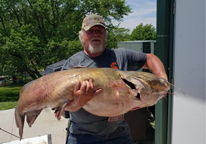Richard Hagen had just landed a 12-pound channel cat on one rod when his other twitched, bobbed and then bent.
He picked it up — and didn’t let go of it for nearly 45 minutes.
“The fight wore me out,” he said. “My arms were getting sore.”
But that was just the start of their relationship. Over the next two days, the Saline County farmhand would name the flathead cat Brutus, help it earn the state’s highest fish honor, carry it around several counties in a water-filled deep freezer, care for it at home, try to find it a forever aquarium and, eventually, return to where it all began.
He didn’t know this Saturday night.
“I just knew I had a big fish. That’s all I knew.”
The 61-year-old likes the fight flathead cats can put up — how they bend your pole at first, then try to rip it from your hands — which is why he’s been chasing them since he was 13. He’s typically somewhere along the banks of the Little Blue and Big Blue rivers two or three times a week, and all weekend.
Brutus weighed 88 pounds on Richard Hagen’s scale, but 89 pounds on a certified scale in Tecumseh.
But that night, he was invited to a birthday party at his niece’s place along the Missouri River near Brownville. He won’t say where.
“I don’t want everyone and their dog to be fishing that area when I go back down
He had a live bluegill on the hook and 50-pound line in the reel when the fish bit at about 8:30 p.m. The closer he coaxed it to the bank, the faster his heart pumped.
And when he finally dragged it out of the water, he guessed its weight at 75 to 80 pounds. He was going by experience; he once caught a 64-pounder in Washington County, Kansas.
The record flathead catfish measured more than 53 inches.
He had a scale in his pickup, so they hung it from a tractor bucket the next morning: 88 pounds.
Hagen wasn’t thinking about state records, but a friend was, and checked. The heaviest flathead catfish in Nebraska, caught 32 years ago in the Loup Power Canal near Genoa, weighed in at 80 pounds.
They put an old freezer in Hagen’s pickup, filled it with water, submerged battery-powered aerators to keep the water oxygenated — and introduced Brutus to his new home.
Hagen posed for a photo first, cradling the fish in his arms like a 90-pound baby.
The state sets a high bar for recognizing new records. The fish must be caught legally, it has to be weighed on a certified scale — witnessed by a state conservation officer and at least one other person — and its species must be verified by a Game and Parks Commission biologist.
And for every legitimate request the state fields — typically five or 10 a year — it rejects just as many fish stories.
“I will tell you, anytime I start hearing rumors or my phone starts ringing, I’m cynical,” said Daryl Bauer, the commission’s fisheries outreach program manager. “Way more often than not, it ends up not being quite as big as they thought it was, or the species was misidentified.”
But when Bauer’s phone rang Sunday, he liked what he heard. Hagen had met a game officer at the smokehouse in Tecumseh, where the fish registered 89 pounds on a certified scale.
Bauer, a biologist, was able to verify the species through photos. His conclusion? A record flathead. All that’s left is the paperwork, he said.
New records are often set by narrow margins, sometimes ounces. Brutus topped the old record by a landslide.
“An 80-pound flathead catfish is a big flathead catfish,” Bauer said. “For him to beat it by almost 10 pounds, that’s blowing it away.”
That Sunday, Hagen drove Brutus to his house in Swanton and started working the phones, looking for a home for the fish. He tried the park system’s aquarium at the Schramm Education Center, but they didn’t have space. He tried Cabela’s but never heard back.
He worried about the big cat. “I was babysitting the fish at nighttime, making sure it stayed alive.”
Monday, they hit the road again, back to his niece’s place along the Missouri.
Brutus returned to the water flopping and splashing.
“I said, ‘Have a happy life.’ And he got me all wet again.”

